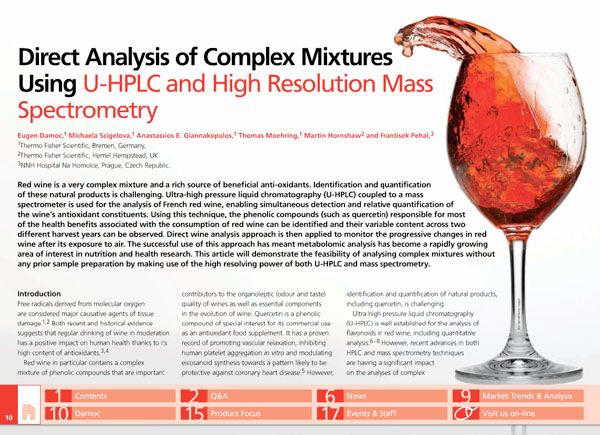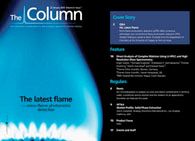Direct Analysis of Complex Mixtures Using U-HPLC and High Resolution Mass Spectrometry
This article will demonstrate the feasibility of analysing complex mixtures without any prior sample preparation by making use of the high resolving power of both UHPLC and mass spectrometry.
Red wine is a very complex mixture and a rich source of beneficial anti-oxidants. Identification and quantification of these natural products is challenging. Ultra-high pressure liquid chromatography (U-HPLC) coupled to a mass spectrometer is used for the analysis of French red wine, enabling simultaneous detection and relative quantification of the wine’s antioxidant constituents. Using this technique, the phenolic compounds (such as quercetin) responsible for most of the health benefits associated with the consumption of red wine can be identified and their variable content across two different harvest years can be observed. Direct wine analysis approach is then applied to monitor the progressive changes in red wine after its exposure to air. The successful use of this approach has meant metabolomic analysis has become a rapidly growing area of interest in nutrition and health research. This article will demonstrate the feasibility of analysing complex mixtures without any prior sample preparation by making use of the high resolving power of both U-HPLC and mass spectrometry
New Method Explored for the Detection of CECs in Crops Irrigated with Contaminated Water
April 30th 2025This new study presents a validated QuEChERS–LC-MS/MS method for detecting eight persistent, mobile, and toxic substances in escarole, tomatoes, and tomato leaves irrigated with contaminated water.
Analytical Challenges in Measuring Migration from Food Contact Materials
November 2nd 2015Food contact materials contain low molecular weight additives and processing aids which can migrate into foods leading to trace levels of contamination. Food safety is ensured through regulations, comprising compositional controls and migration limits, which present a significant analytical challenge to the food industry to ensure compliance and demonstrate due diligence. Of the various analytical approaches, LC-MS/MS has proved to be an essential tool in monitoring migration of target compounds into foods, and more sophisticated approaches such as LC-high resolution MS (Orbitrap) are being increasingly used for untargeted analysis to monitor non-intentionally added substances. This podcast will provide an overview to this area, illustrated with various applications showing current approaches being employed.
Prioritizing Non-Target Screening in LC–HRMS Environmental Sample Analysis
April 28th 2025When analyzing samples using liquid chromatography–high-resolution mass spectrometry, there are various ways the processes can be improved. Researchers created new methods for prioritizing these strategies.

.png&w=3840&q=75)

.png&w=3840&q=75)



.png&w=3840&q=75)



.png&w=3840&q=75)










